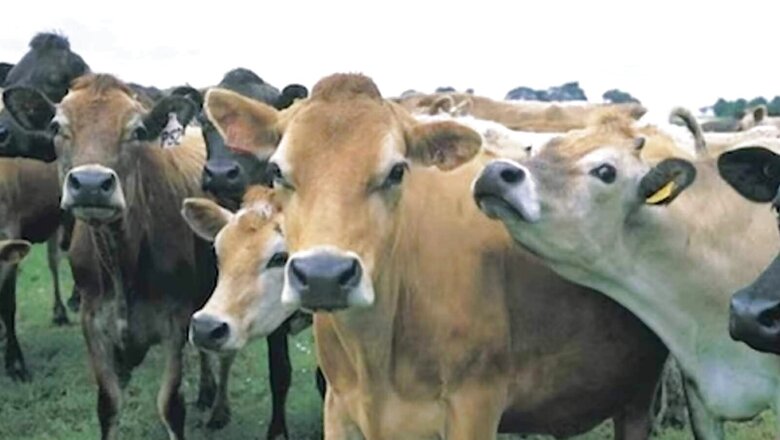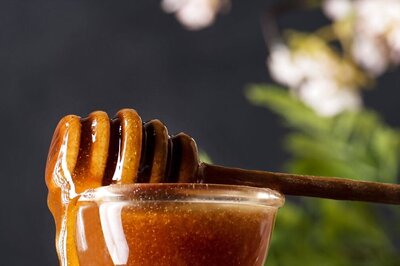
views
The Animal Welfare Board of India has issued a notice appealing to cow lovers to celebrate 14 February— a day celebrated across the world as Valentine’s Day — as ‘Cow Hug Day.’ Hugging a cow, according to the government advisory committee, will bring “emotional richness” and boost “individual and collective happiness.” Even the British Broadcasting Corporation (BBC) in an article in 2020 wrote about how cow hugging is the world’s new wellness trend.
As stated by the Animal Welfare Board of India (AWBI), in an appeal signed by its secretary, SK Dutta, the cow represents the backbone of Indian culture and the rural economy, sustaining life and reflecting livestock richness and biodiversity, and rightly so. “It is known as Kamdhenu and Gaumata due to its nurturing character as a mother, the giver of all, and the provider of riches to humanity. Because of the advancement of Western culture over time, Vedic traditions are on the verge of extinction. The glitz of Western civilisation has practically obliterated our physical culture and history,” the official letter notes.
Hindus believe that the creator created everything and that the creator exists in everyone; all in one and one in all. As a result, we frequently encounter Hindu deities in the shape of or accompanied by animals. The cow is revered in our Sanatana Vedic culture since it gives us milk, health, prosperity, and food. As a result, in Hindu tradition, a cow is regarded as a mother. It is worshipped on numerous occasions, most notably on the first day of Diwali, known as Vasubaras. According to the Vedas, the cow is the ideal animal in Brahma’s creation. The cow is thought to be a god’s abode and is the highest and most revered animal. In the Vedas, the cow is referred to as Aditi, Dhenu, Aghanya, and other names. The Rig Veda mentions the cow 723 times, the Yajur Veda 87 times, the Sama Veda 170 times, the Atharva Veda 331 times, in total, 1311 times. It represents motherhood and compassion around the world. On occasion, cows are employed to symbolise ‘light’ and ‘rays’ in the Rig Veda. Aditi, the supreme Prakriti (or nature force), is frequently portrayed as a cow in the Rig Veda, and Deva, the supreme soul, is described as a bull. The belief is that worshipping and serving the cow will lead to nirvana. Lord Krishna and Balram were the first to establish ‘cow worship and preservation’ during the Dwapar Yuga.
Since the announcement, social media has been rife with a mixed bag of reactions. While some people are welcoming the decision, reminding us about the importance the cow has in the Indic tradition and texts. There are many who are ridiculing it for promoting “superstition” and “blind faith”.
There is also a section of people who revere cows but find the move insincere. What’s the use of hugging cows when they face daily hardships? We often see them roaming on roads, endangering themselves and the lives of commuters. Many people riding two-wheelers have been injured after the vehicles skidded because of cow dung on the road. The animals too get injured many times.
Even more distressing is to see the cow, which we regard as our mother, eat garbage on the road, containing plastic bags, indigestible materials and sharp objects. One hears hundreds of cases of bloat, fractures, horn avulsion, acidosis and impaction of rumen.
Then, there is another side of cow treatment that reveals Hindu hypocrisy. Cows are kept in most households in smaller towns and villages, but when they grow old they are sold to butchers. People know very well that these cows would be killed for their meat or skin, but nothing is done to stop this. Hindus worship cows, but when they grow old, the same set of people forget the sanctity of cows and sell them to butchers.
In this backdrop, Cow Hug Day seems nothing but another photo-op endeavour. Why hug cows for just one day? Every time you see them on the road, hug them and provide them with proper refuge. Every time you see them eating garbage full of polythene bags, hug them and provide them with proper food.
Yuvraj Pokharna is an independent journalist and columnist. He tweets with @pokharnaprince. Views expressed are personal.
Read all the Latest Opinions here


















Comments
0 comment